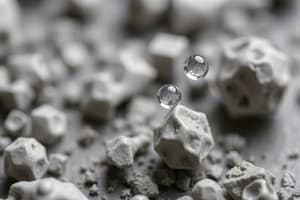Podcast
Questions and Answers
Match the following properties with their corresponding materials:
Match the following properties with their corresponding materials:
Waterproof = Rubber Absorbent = Fabric Rigid = Steel Flexible = Plastic film
Match the following properties with their applications:
Match the following properties with their applications:
Rigid = Tools Flexible = Protective gear Hard = Gemstones Waterproof = Raincoat
Match the following descriptions with their corresponding property:
Match the following descriptions with their corresponding property:
Bend and stretch without breaking = Flexible Resistant to scratching and denting = Hard Accommodate expansion and contraction = Rigid Return to original shape after deformation = Absorbent
Match the following properties with their importance in materials selection:
Match the following properties with their importance in materials selection:
Match the following materials with their primary property:
Match the following materials with their primary property:
Flashcards are hidden until you start studying
Study Notes
Properties of Materials
Understanding the properties of materials is essential in various fields such as engineering, chemistry, and physics. Material properties determine how materials behave under different conditions and influence their use and application. This article discusses several material properties including waterproof, absorbent, rigid, flexible, and hard.
Waterproof
Waterproof materials are designed not to allow water or moisture penetration. These materials have low water absorption rates and maintain their integrity even when exposed to water. Common examples include rubber, certain plastics like polyethylene, and some types of fabric like Gore-Tex. Waterproof materials are used in industries such as construction, clothing, and transportation to protect against environmental factors that could compromise product performance and durability.
Absorbent
Absorbent materials can soak up liquids quickly and effectively. Examples include paper towels, cotton cloth, and sponges. The degree of absorbency varies between materials and depends on factors like porosity, chemical composition, and structure. Absorbent materials are often used in cleaning applications, filtration systems, and hygiene products.
Rigid
Rigid materials maintain their shape and do not easily change form when subjected to external forces like compression or tension. They are typically solid and have high strength. Examples include steel, glass, concrete, and wood. Rigidity is an important property in structures where stability and resistance to deformation are critical.
Flexible
Flexible materials bend and stretch without breaking. Their elasticity allows them to return to their original shape after being deformed. Rubber, plastic films, fabrics, and certain alloys exemplify this property. Flexibility enables these materials to adapt to complex shapes and conform to surfaces without damage. It is also crucial for energy storage devices like batteries and supercapacitors, which need to accommodate expansion and contraction during operation.
Hard
Hard materials are resistant to scratching and denting. They possess high stiffness and strength. Metals like steel, ceramics, and gemstones fall into this category. Hardness is crucial in applications where protection from wear and tear is necessary, such as tools, protective gear, and jewelry.
In summary, understanding the properties of materials is vital for selecting appropriate materials for specific applications. By knowing a material's waterproof, absorbent, rigid, flexible, and hard qualities, engineers and scientists can make informed decisions about what materials to use in their designs and processes. This knowledge ensures safety, efficiency, and effectiveness across various industries.
Studying That Suits You
Use AI to generate personalized quizzes and flashcards to suit your learning preferences.




